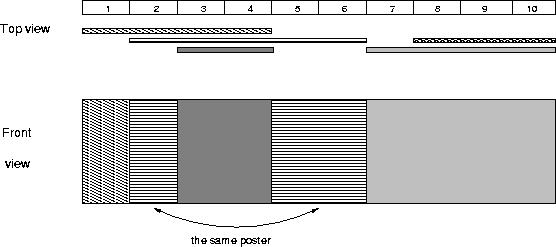题意 在墙上贴n张海报 输入每张海报的的左右端点坐标 问最后可以看到多少张海报 能看到一点也是能看到
先把线段树初始化为0 输入一张海报 就把那个区间变成这张海报的序号 最后判断墙上有多少个不同的序号就行了
但是海报坐标的端点值高达10000000 直接用线段树会超时 但是注意到海报最多只有10000张 也就是最多有20000个不同的坐标 于是可以利用离散化的知识 把所有坐标排序 注意所有右端点坐标+1也要加入排序(注意1,10 ; 1,3; 7,10这种情况 如果右端点+1没加入排序的话可能使原来不相邻的变为相邻 这样就覆盖了本来没有覆盖的区间) 可以发现 把每个端点的坐标变为该点排序后的序号不会改变整个图形的结构 于是就可以用序号代替坐标了 大大减小了复杂度
#include <cstdio>
#include <cstring>
#include <algorithm>
#define lc p<<1,s,mid
#define rc p<<1|1,mid+1,e
#define mid ((s+e)>>1)
#define CLR(A) memset(A,0,sizeof(A))
using namespace std;
const int N = 20005;
int col[N * 4], setv[N * 4], vis[N];
int le[N], ri[N], c[N * 2], ans;
void pushup(int p)
{
col[p] = (col[p << 1] == col[p << 1 | 1] ? col[p << 1] : -1);
}
void pushdown(int p, int s, int e)
{
if(!setv[p] || s == e) return;
setv[p << 1] = col[p << 1] = setv[p];
setv[p << 1 | 1] = col[p << 1 | 1] = setv[p];
setv[p] = 0;
}
void update(int p, int s, int e, int l, int r, int v)
{
if(s == l && e == r)
{
setv[p] = col[p] = v;
return;
}
pushdown(p, s, e);
if(r <= mid) update(lc, l, r, v);
else if(l > mid) update(rc, l, r, v);
else update(lc, l, mid, v), update(rc, mid + 1, r, v);
pushup(p);
}
void query(int p, int s, int e, int l, int r)
{
if(e < s) return;
if(s == l && e == r && col[p] != -1)
{
if(!vis[col[p]]) vis[col[p]] = 1, ++ans;
return;
}
pushdown(p, s, e);
query(lc, l, mid);
query(rc, mid + 1, r);
}
int compress(int n) //离散化
{
int k = 0;
for(int i = 0; i < n; ++i)
{
c[k++] = le[i];
c[k++] = ri[i];
c[k++] = ri[i] + 1;
}
sort(c, c + k);
return unique(c, c + k) - c - 1;
}
int main()
{
int cas, m, n, l, r;
scanf("%d", &cas);
while(cas--)
{
scanf("%d", &m);
for(int i = 0; i < m; ++i)
scanf("%d%d", &le[i], &ri[i]);
n = compress(m);
ans = 0;
CLR(col), CLR(vis), CLR(setv);
for(int i = 0; i < m; ++i)
{
l = lower_bound(c, c + n, le[i]) - c + 1;
r = lower_bound(c, c + n, ri[i]) - c + 1;
update(1, 1, n, l, r, i + 1);
}
vis[0] = 1;
query(1, 1, n, 1, n);
printf("%d\n", ans);
}
return 0;
}
Description
Input
Output

Sample Input
1 5 1 4 2 6 8 10 3 4 7 10
Sample Output
4
Source
POJ 2528 Mayor's posters(离散化 线段树)
原文地址:http://blog.csdn.net/acvay/article/details/45115469